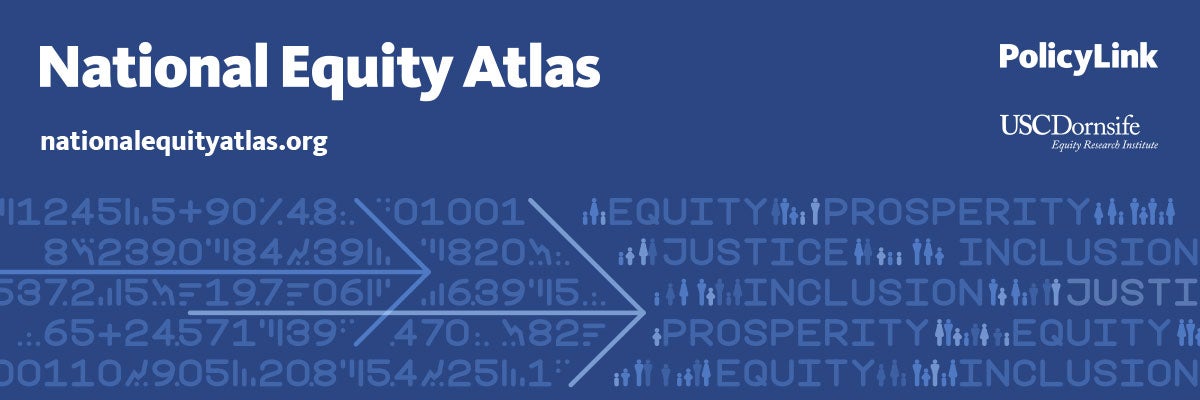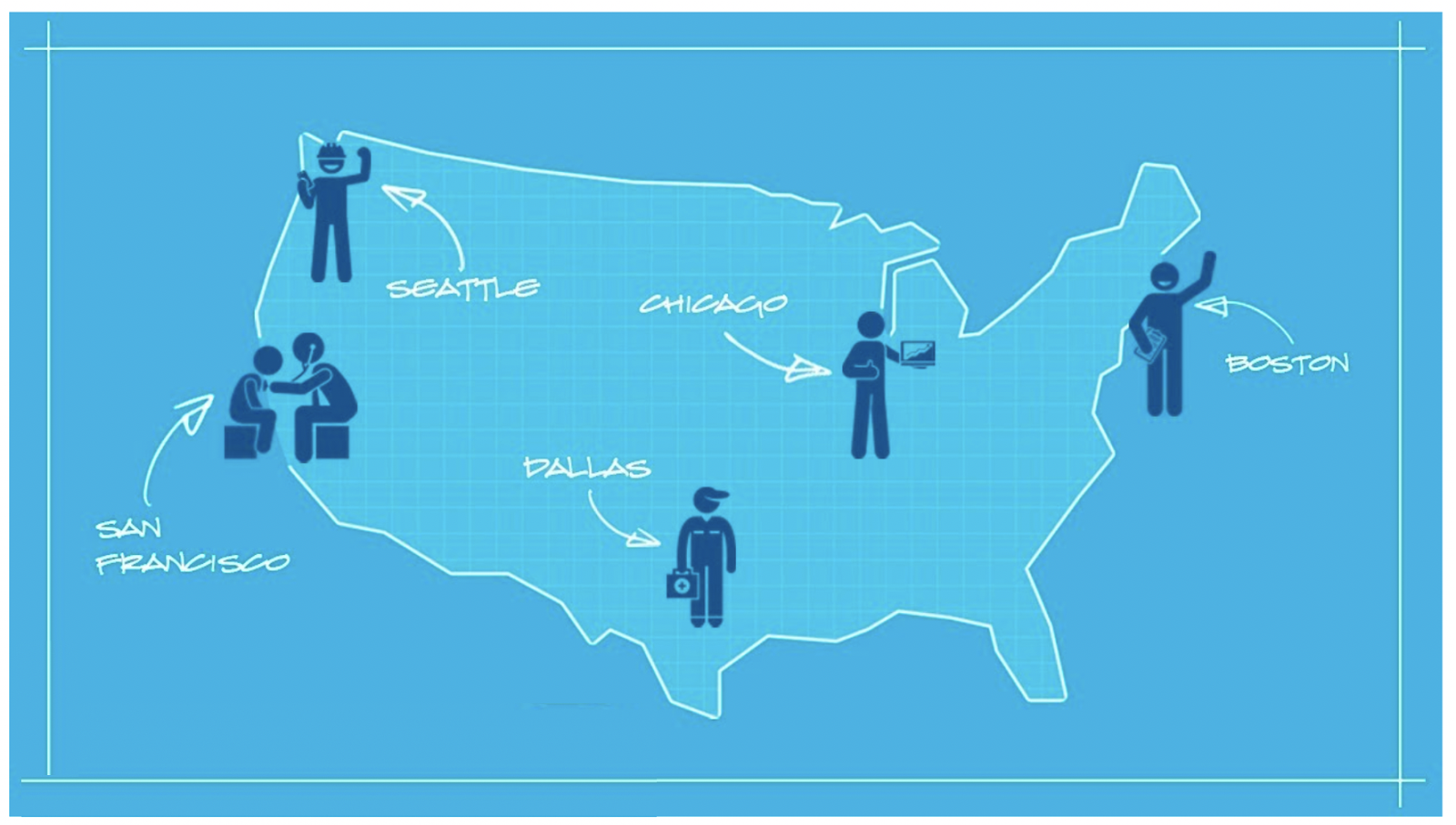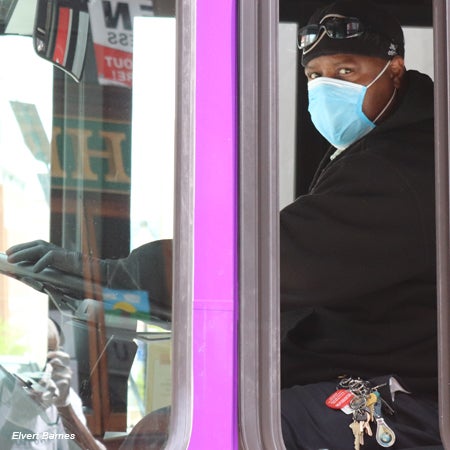
Advancing Workforce Equity: A Blueprint for Regional Action in Five U.S. Cities

As our nation faces overlapping and interconnected public health, economic, and racial justice crises, it is more important than ever that we redesign workforce strategies for a more resilient and inclusive economy. In partnership with Burning Glass Technologies, the National Fund for Workforce Solutions, and local leaders, and with support from JPMorgan Chase, we released five new reports on the state and future of workforce equity in Boston, Chicago, Dallas, the San Francisco Bay Area, and Seattle.
The reports are part of the Advancing Workforce Equity project. We worked closely with local leaders to analyze tailored data, identify the key drivers of inequity, and prioritize actionable strategies to advance equity through their policy efforts, programs, and investments. This series of reports will serve as the basis for long-term equity-focused efforts.
Our key findings include the following:
- There are not enough good jobs to go around, and workers of color are overrepresented in low-quality jobs. Across these five regions, only 40-50 percent of workers are in “good jobs.”
- Racial inequities in income are a drag on regional economic growth. The unrealized GDP ranges from $33 billion in Seattle to $348 billion in the San Francisco Bay Area and will only increase as the workforce diversifies.
- Occupational segregation, where workers of color are crowded into low-wage jobs, is entrenched and perpetuates inequities.
- In many regions, Black and Latinx workers with an associate’s degree earn the same or lower median wages as their White counterparts with only a high school diploma.
- Workers of color face significant, disproportionate risk of job loss as a result of automation.
Informed by our data analysis, local collaboratives developed tailored, ground-up strategies to advance workforce equity in their regions by dismantling barriers to entry and advancement in the labor market, reducing occupational segregation, building worker power, and improving job quality for all.
- Boston, in partnership with SkillWorks
- Chicago, in partnership with the Chicagoland Workforce Funder Alliance
- Dallas and Collin Counties, Texas, in partnership with Pathways to Work
- San Francisco Bay Area, in partnership with ReWork the Bay
- Seattle, in partnership with the Workforce Development Council of Seattle-King County
Race and the Work of the Future: Advancing Workforce Equity in the United States
November 2020
By Abbie Langston, Justin Scoggins, and Matthew Walsh
PolicyLink, USC Equity Research Institute, Burning Glass Technologies, and the National Fund for Workforce Solutions
In the wake of the coronavirus pandemic, massive job losses, rapidly evolving business models, and accelerating technological change are dramatically reshaping the US economy. This report, produced in partnership with Burning Glass Technologies and the National Fund for Workforce Solutions, provides a comprehensive analysis of long-standing racial gaps in labor market outcomes, the economic impacts of Covid-19, and the racial equity implications of automation. It provides in-depth analysis of disaggregated equity indicators and labor market dynamics, finding that White workers are 50 percent more likely than workers of color to hold good jobs and that eliminating racial inequities in income could boost the US economy by $2.3 trillion a year. In addition to detailed data analysis on the state of racial inequities in jobs and opportunity, the report offers a bold framework for action to advance workforce equity, where racial income gaps have been eliminated, all jobs are good jobs, and everyone who wants to work has access to family-supporting employment.

Race, Risk, and Workforce Equity in the Coronavirus Economy
June 2020
By Abbie Langston and Sarah Treuhaft (PolicyLink), Justin Scoggins (USC Program for Environmental and Regional Equity), and Joel Simon and Matthew Walsh (Burning Glass Technologies)*
Over a span of less than three months, the COVID-19 pandemic has radically upended the lives and livelihoods of millions of workers and their families. More than 42 million workers have filed for unemployment insurance, and economists have estimated that 100,000 small businesses have permanently closed. But while the pain has been widespread, it has not been equally shared: workers of color and immigrant workers, especially women, are being hardest hit by the loss of jobs and income and are disproportionately employed in the lowest-wage, essential jobs that place them at risk of contracting the virus.
While national data has shown that people of color are concentrated in essential jobs and that Black and Latinx workers have higher unemployment rates, thus far we have lacked detailed data describing who are the most impacted workers in this crisis — crucial facts needed to inform relief and recovery strategies at the local, state, and national levels. This analysis aims to fill that gap.
Based on data on changes in job openings between March 2 and April 13 from Burning Glass Technologies layered with data on worker demographics and wages from the Census, this report offers the most comprehensive analysis of the economic impacts of the crisis on workers by race, gender, nativity, and occupation to date for the United States as a whole and 10 metropolitan regions: Boston, Chicago, Columbus, Dallas, Detroit, Los Angeles, Miami, Nashville, San Francisco, and Seattle.
To address the inequities highlighted in this analysis and lay the foundation for an equitable recovery, policymakers must protect workers by ensuring safe conditions and adequate protections and improving the pay and quality of low-wage jobs; supporting dislocated workers through direct supports and targeted job training and placement programs; and plan for a changed economic landscape in the wake of the pandemic downturn. Read our policy recommendations.




